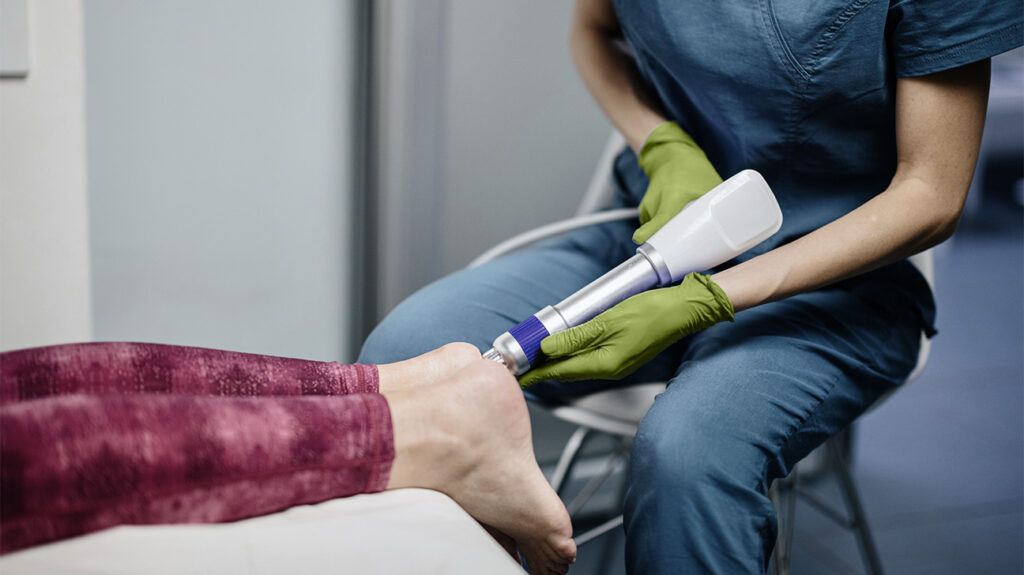Extracorporeal shockwave therapy uses shock waves to help with healing, pain reduction, and repair processes. It is a noninvasive treatment option for various conditions that affect the musculoskeletal system.
Extracorporeal shockwave therapy (ESWT) uses a device to produce shock waves and transmit them to a certain area of the body. These pressure waves result in a biological effect within the body, promoting certain processes and helping to reduce pain.
ESWT treatment requires multiple doses and sessions. With appropriate use, it generally does not lead to severe complications. Still, there is a risk of side effects, and doctors do not recommend it in certain cases.
This article will address what ESWT is, how it works, side effects, limitations, effectiveness, and other common questions.

ESWT is a noninvasive therapy that uses shock waves to help promote healing and reduce pain. It is a treatment option for various conditions affecting the following:
- muscles
- tissues
- joints
- bones
- other parts of the musculoskeletal system
ESWT
ESWT uses a device to apply short, high energy sound waves to specific areas of the body. Intensity levels and types of shock waves depend on a person’s treatment.
When these pressure waves pass through the body’s tissues, they cause a biological response that promotes healing, repair, and pain relief. However, researchers do not yet fully understand exactly how these therapeutic effects occur.
ESWT takes time to work and tends to involve multiple sessions over time. A single session can involve hundreds or thousands of shock waves.
Healthcare professionals use ESWT to help treat various musculoskeletal conditions, such as:
- tendinopathies
- tendonitis
- osteoarthritis
- low back pain
- nerve entrapments
- fractures
- delayed bone healing
- osteonecrosis or avascular necrosis
According to a
For example, a
Multiple devices can administer shock waves. Some produce focal shock waves, while others produce radial waves.
Focal shock waves have a higher intensity that
Meanwhile, radial shock waves have a lower intensity. Radial devices
Some of the typical side effects a person experiences may include:
- minor or moderate pain or discomfort
- skin discoloration
- mild bruising
- tingling
- numbness
- swelling
- nerve irritation
- dizziness
- inflammation
- throbbing
However, health experts do not recommend ESWT in certain cases. In some situations, high energy doses are inadvisable, though low energy doses may be more suitable.
ESWT, or specifically high energy ESWT, may be inappropriate
- a serious infection
- complete tendon rupture
- bleeding or blood clotting disorders
- cancerous tissue in the treatment area
- cancer that has spread
- multiple myeloma
- lymphoma
It may also be inappropriate for pregnant people.
In addition, high energy ESWT is unsuitable when certain structures, such as a growth, a plate, or the spine, are present in the treatment area.
Insurance may not cover ESWT costs. Doctors may not consider it a medically necessary treatment.
Someone can check with their insurance provider to see if ESWT meets their coverage criteria.
Below are answers to common questions about ESWT.
What does extracorporeal shockwave therapy do?
ESWT uses shock waves to help reduce pain and encourage healing or repair in the treatment area. It is an option for people with certain musculoskeletal conditions.
What are the negative side effects of shockwave therapy?
With appropriate use, side effects are not usually severe. Still, they may include pain, swelling, skin discoloration, bruising, tingling, numbness, nerve irritation, or dizziness.
How painful is shockwave therapy?
A person may experience pain or discomfort during ESWT treatment itself. However, a doctor can adjust doses according to pain levels.
Who should not receive shockwave therapy?
A doctor can decide whether shockwave therapy is appropriate for a person.
Generally, the technique is inadvisable for people who are pregnant or have a severe infection, a serious blood clot disorder, certain injuries, or certain structures in the treatment area. It may also be unsuitable for those with certain cancers.
Low energy doses may sometimes be more suitable over high energy ESWT.
Extracorporeal shockwave therapy (ESWT) is a noninvasive treatment option for certain musculoskeletal disorders. This therapy uses shock waves to help promote healing, pain reduction, and repair in the treatment area. The type of shock waves and level of intensity vary according to individual treatment.
Doctors generally consider the technique effective, although its effectiveness depends on the condition and other factors. It is unsuitable in certain cases. Some side effects a person can experience may include pain, skin discoloration, tingling, and bruising.
